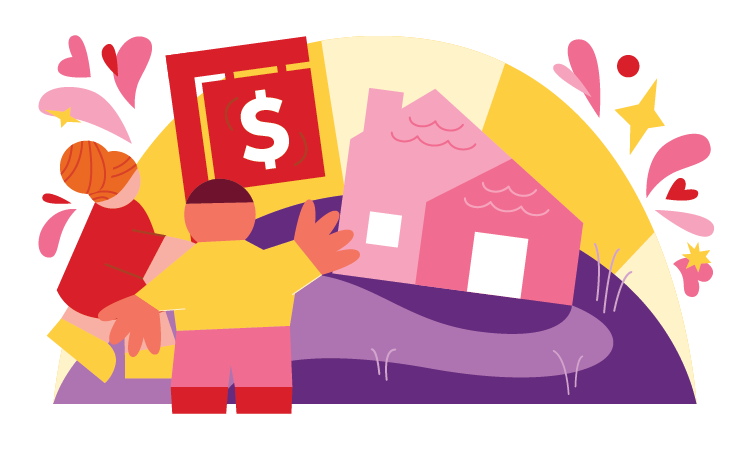The Love & Money Series
Helping you plan with care for the people and moments that matter
Key takeaways
- Before pursuing the purchase of a home, Wells Fargo specialists suggest couples have honest conversations about their goals and financial values.
- After gaining alignment on financial values, lean into a comprehensive review of your individual and personal finances.
- Using the prequalification process is a great way to learn how much you may be able to borrow prior to making offers on homes.
Escrow accounts. Fixed and adjustable-rate mortgages. Inspections. Credit scores. Amortization schedules. Property taxes. Deeds, defaults, and delinquencies.
Approaching homeownership for the first — or next — time can feel daunting. But Rulon Washington, executive director of Mortgage Sustainability and Business Execution for Wells Fargo’s Home Lending Growth Segments group, doesn’t want you to feel overwhelmed.
His suggestion? Segmenting. Before making an offer on a home, use a step-by-step process to ensure you’re informed and ready.
- Step 1: Determine your financial values as a couple.
- Step 2: Give a hard look at your individual and combined finances.
- Step 3: Understand the prequalification process.
“The journey to homeownership is amazing,” he said. “A home you own is so much more than just a dwelling where you live. It represents the ability to manage what is likely the largest piece of debt you’ll have and show you’re financially responsible.”
That journey starts not with a spreadsheet or data set, but with communication.
Talk about your values
The 2025 Wells Fargo Money Study (PDF)1 revealed a surprising finding — people don’t like talking about money. 56% of survey respondents said they keep their money a secret. For couples combining finances and thinking about homeownership, transparency is key.
“If you walk into a relationship and haven’t had basic conversations about what you’re financially bringing, you’re already behind,” said Lorilee Mills, a senior family dynamics consultant in Wells Fargo’s Advice and Planning. “It really is all about your financial values and a willingness to be open with each other, and that’s hard. But often when making money decisions like buying a home, the actual dollars and cents are easy. It’s the attached emotions that can present challenges.”
Financial values are the basic building blocks and core beliefs of how an individual feels money should be spent. They are often the impetus for key financial decisions and help create lifelong spending habits. Couples with very different financial values will need to find compromise when creating their shared financial values.
“If I come into a relationship with some money scars — maybe I spend too little or too much — that has a huge impact on what I’m trying to achieve,” Mills said. “The foundation of everything is having financial and values conversations before you step into a huge decision like buying a home.”

Determining your financial values can be difficult.
Alongside your partner, ask a few of these questions to start formulating your values:
- Do we want children? If so, how many?
- Where do we want to live?
- What kind of community do we want to live in?
- Is homeownership important to us?
- Do we want to maximize our earning potential?
- Do we value experiences more than possessions?
“If you walk into a relationship and haven’t had basic conversations about what you’re financially bringing, you’re already behind.”
Deep dive into personal finances
Now that couples have determined where they want to go together financially via their values, figuring out how to get there is a logical next step. And getting there, again, requires honesty and self-examination.
“The notion of starting a process like homeownership can be overwhelming,” said Washington. “The best thing to do is be prepared and have a plan of attack. To do that though, you have to really drill down into your finances.”
Is now the right time?
Choosing when to buy a home is a very personal decision that will depend on many factors. A home is the largest purchase most people will make in their lifetime, so preparation is key.
The following questions can help you determine if you’re ready to make the leap:
- Do you have a stable source of income?
- Are you budgeting for your monthly bills?
- Do you know how much you can afford for a monthly mortgage payment?
- Once purchased, how long do you plan to stay in your home?
“It’s all relative, but it’s never a bad move to start the process of buying a home if your overall goal is to own a home,” said Washington. “It gets harder and harder every year to get a home. There are things we can’t control, like cost, interest rates, and availability. The longer you wait, the less control you might have on some of these variables and complexities.”
“The advantages of owning a home far outweigh the advantages of not owning a home,” he continued. “You can build equity to enhance the property, generate long-term wealth from owning real estate, and create a home you hopefully love.”
Glossary
Interest rate: The percentage of your loan amount you’re charged to borrow money.
Annual Percentage Rate: The total cost of borrowing money for a year, including interest and fees.
Mortgage: A legal agreement by which a bank or other creditor lends money at interest in exchange for taking title of the debtor’s property, with the condition that the conveyance of title becomes void upon the payment of the debt.
Escrow: A special account your mortgage lender creates to manage property taxes and insurance payments on your behalf
Down payment: The sum of money you pay up front to make up the difference between the price of the home and the amount of the mortgage.
Title: Legal ownership of a home.
Preparing your money
- Start saving. Depending on the mortgage you ultimately select, you may have to put money down to secure a home. A down payment is the sum of money you pay up front to make up the difference between the price of your home and the amount of the mortgage.
- Understand your credit report. Your credit report is a summary of your credit history. There are three major credit bureaus in the United States who collect information about you, including your credit: Experian, TransUnion, and Equifax. Credit reports show your personal financial information, like bill payment history, current debt, and loans.
- Understand your credit score. A credit score is a numerical representation meant to show how likely an individual is to repay loans on time. They typically range from 300 to 850.
- Account for all income and spending. A good understanding of where your money comes from — and goes — will help with the budgeting process for a mortgage.
“A lender is looking at three components — ability to pay, credit score, and how much loan you can actually manage,” said Washington. “A lot of people don’t know they can get their score for free, so I recommend taking advantage of that.”
You can request your reports online by visiting AnnualCreditReport.com, the only website authorized by the federal government to issue free, annual credit reports from the three credit bureaus in the United States.

According to the Consumer Financial Protection Bureau (CFPB), spouses don’t have to co-sign on a mortgage loan. This is helpful for couples who may have disparate credit scores not allowing them to take advantage of the best rates. For example, a couple with individual credit scores of 625 and 760 can both be on the mortgage, however, the difference might cause the couple to have a higher interest rate. Putting the mortgage in one spouse’s name, while the home’s title is in the name of both, is a strategic play that could save homeowners money.
“Coming in with a high score is always advantageous for rates and borrowing power,” Washington said. “Some couples choose to have the mortgage in the name of the partner with the highest credit score. The other spouse is referred to as a non-borrowing spouse and, while the financial responsibility won’t fall on them, their name is still on the title of the home — they’re still an owner.”
Think about homeowner expenses
Owning a home means taking on the responsibility of homeowner-specific expenses. Below are some of the most common expenses new homeowners should be familiar with.
- Insurance: Homeowners insurance covers specific aspects of your property, as well as the belongings you keep in your fixed structure (home and attached garage). It may also help protect you financially if a person is injured on your property. Flood insurance is only required if your home is in a Special Flood Hazard Area. It can financially protect your house and belongings in the event of a flood. Private mortgage insurance (PMI), which is figured into your monthly mortgage payment, is typically required if you make a down payment of less than 20% on your home.
- Utilities: If you own your own home, you’ll likely pay for all utilities yourself. To estimate the full cost for a home’s utilities, research the average utility costs for homes in your area.
- Taxes: As a homeowner, you’ll be required to pay property taxes based on the appraised value of your home. If you have escrow, these will be part of your monthly mortgage payment. In some cases, mortgage interest or property taxes could be tax-deductible. Be sure to consult a tax advisor regarding the deductibility of interest and taxes.
- Maintenance: For a single-family home, you’re responsible for all maintenance expenses and upkeep, such as fixing or replacing a leaky roof or HVAC system, lawn maintenance, and more. Condominiums and townhouses may have some maintenance costs and labor covered with homeowners association (HOA) dues.
Get prequalified
Determine how much home you can afford
- Use some simple math. Do you know your gross monthly income? This is how much money you make each month before taxes and other costs are taken out. If you’re trying to find which monthly mortgage payment you may be able to afford, start by multiplying your gross monthly income by 0.25. Combine your gross monthly incomes before starting the math. The result will equal 25% of your income.
- Adjust for your situation. Next, start building your budget. Take the monthly base mortgage payment from Step 1 and list additional expenses you may need to pay as a new homeowner, such as property taxes, homeowners’ insurance, utility costs, ongoing potential maintenance costs, and even PMI if you put less than 20% down on the home.
- Use a calculator. Use Wells Fargo’s online home affordability calculator to understand what loan amount and monthly mortgage payment may be most comfortable for you. Consider all the payment and budget information from Steps 1 and 2 to understand what you may be able to afford monthly.
FAQ
A down payment is the portion of your home’s purchase price that you pay in cash up front to get your loan. Many people believe you need a 20% down payment to buy a home, but there are many mortgage options that allow you to put down less. In fact, Wells Fargo has a 3% down payment option on a fixed-rate loan and low or no down payment for qualified borrowers. With a low down payment, mortgage insurance will be required, which increases the cost of the loan and will increase the monthly payment.
Mortgage prequalification is a simple process that uses your income, debt, and credit information to let you know how much you may be able to borrow. Getting prequalified before you shop for homes can help you:
- Focus your search. Establishing your price range up front means you can target the right homes within your budget.
- Move forward confidently. When it’s time to make an offer, you’ll have the confidence of knowing you can back it up.
- Know your options. Seeing the loan amount, interest rate, and monthly payment you could qualify for means you’ll be able to make the mortgage decision that works best for you.
Homebuying starts here
Find tips and homebuyer education to help you make smart moves at every step of your journey.






